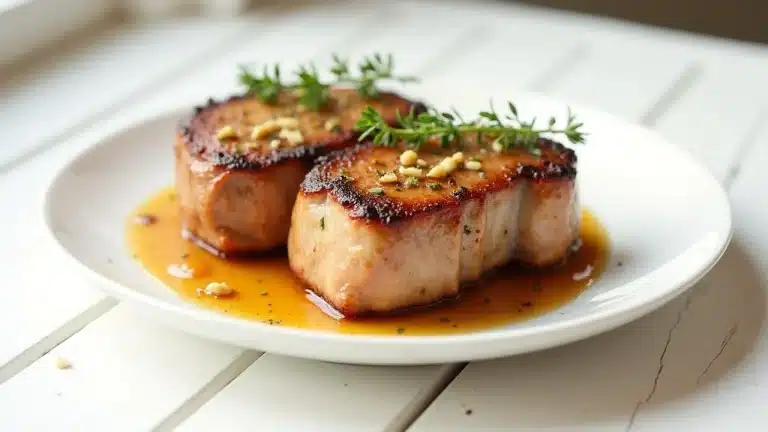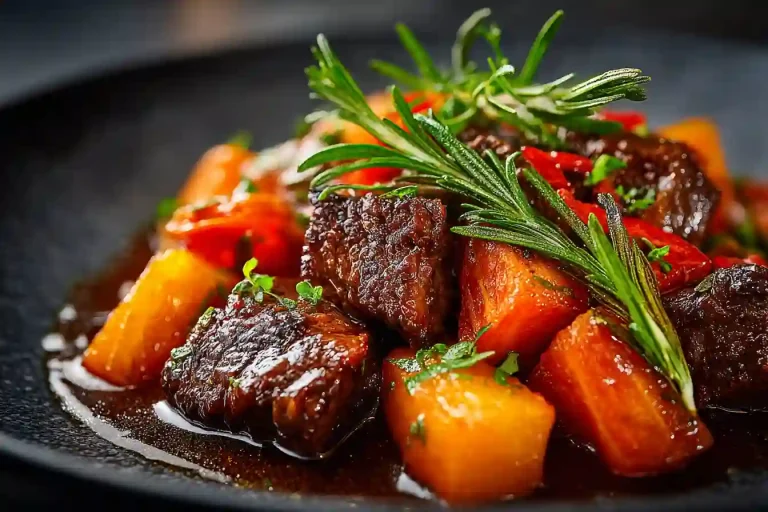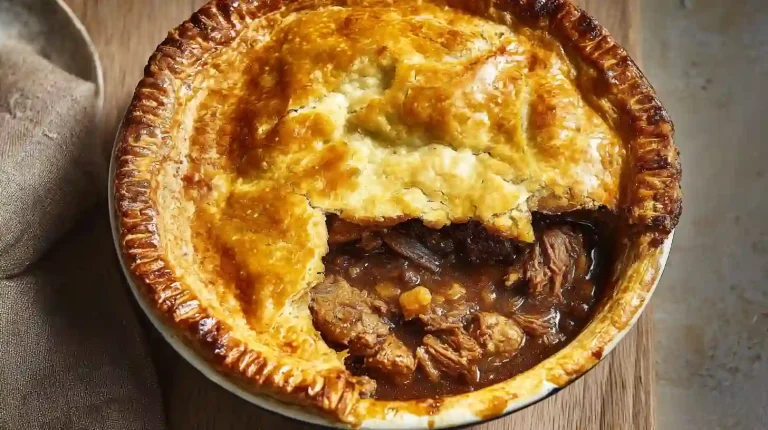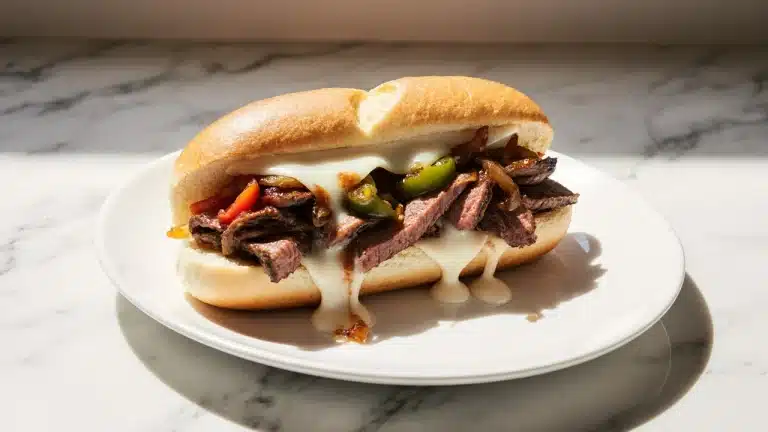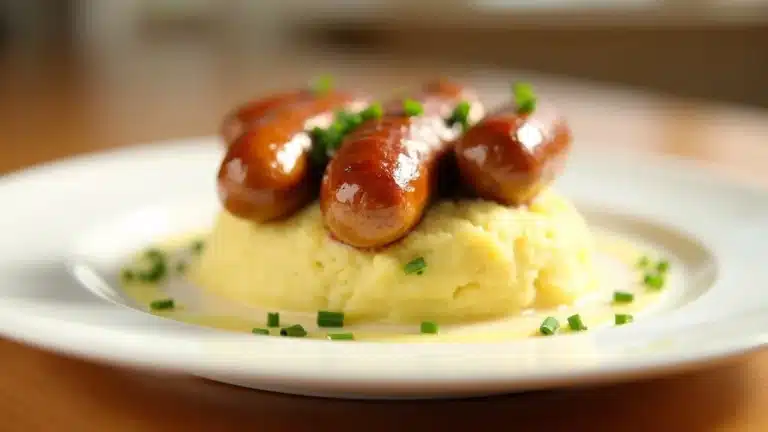Gordon Ramsay Lamb Curry Recipe
Gordon Ramsay lamb curry is a game-changer in the kitchen. The first time I made it, the aroma had everyone drooling before the meal even hit the table—a sensory overload of spices and tender lamb. I used to shy away from making curry, fearing it would be too complicated or time-consuming. But Ramsay’s approach makes it accessible and packed with flavor. With a few simple steps, you’ll transform humble ingredients into a show-stopping dish that feels like a restaurant experience right at home. Grab that spice cabinet and let’s dive into this flavorful journey!

Essential Ingredients for Gordon Ramsay Lamb Curry
Selecting the Right Lamb Cut
Getting the cut right sets you up for a good result. I pick boneless shoulder or leg, trim excess fat, and cut into 2–3 cm cubes from about 500 g of meat. Shoulder has more connective tissue and works well for slow cooking, while leg stays firmer with a quicker simmer.
Tip: If you grab a cheaper cut with more sinew, don’t worry—low and slow braising will make it tender and tasty.
Must-Have Spices and Aromatics
Spices make the dish. Keep 2 tsp ground coriander, 1 tsp turmeric, 1 tsp cumin on hand, plus 4–5 whole cardamom pods, 1 cinnamon stick, and 4 cloves. For aromatics use 1 large onion (finely chopped), 4 garlic cloves, and a thumb-sized knob of ginger (grated).
Pro tip: Bloom the ground spices in hot oil for about 30 seconds to open up the flavor—don’t skip it or you’ll miss that signature “gordon ramsay lamb curry” punch.
Pantry Staples for the Curry Base
Use a 400 g tin of crushed tomatoes, 200 ml coconut milk or 100 g plain yogurt, and 100 ml stock (vegetable or chicken). Add 2 tbsp tomato paste for richness and a squeeze of lemon juice to lift the sauce. Season salt and pepper in layers while you cook.
Heads-up: Canned tomatoes can be acidic; a pinch of sugar balances the tartness without making the curry sweet.
Prepping the Lamb and Spices
Trimming and Cubing Lamb
Dry the lamb with paper towels so you get a sear instead of steam. Remove silver skin and large fat pockets, then cut into even 2–3 cm cubes so everything cooks the same. If pieces vary, the smaller bits will overcook while larger ones stay tough.
Key: A little patience here keeps the meat from turning rubbery.
Marinating for Flavor and Tenderness
Mix the lamb cubes with 100 g yogurt, 1 tsp salt, 1/2 tsp turmeric, and a squeeze of lemon. Chill for at least 30 minutes, up to 4 hours. The yogurt helps tenderize while letting spices sink into the meat.
Don’t over-marinate beyond 8 hours or the meat can get mealy.
Toasting and Grinding Whole Spices
Warm a dry skillet over medium for about a minute, then add the cardamom, cinnamon, and cloves. Toast until fragrant, roughly 1–2 minutes, shaking the pan as they heat. Grind coarsely in a mortar and pestle and toss into your spice mix.
Warning: Burnt spices taste bitter. Aim for a golden, nutty aroma, not char.
Cooking Techniques for Succulent Lamb Curry
Simmering on the Stovetop
Heat 2 tbsp oil in a heavy pan over medium-high and brown the lamb in batches, about 2 minutes per side—don’t crowd the pan. Remove the meat, sweat the onions until golden (about 5 minutes), add ginger and garlic for a minute, then return the lamb with your spice blend.
Pour in the tomatoes and stock, bring to a gentle simmer, cover, and cook for 60–75 minutes, stirring now and then. Aim for a soft bubble—boiling hard will break the meat apart in the sauce.
Oven-Braising Alternative
Preheat the oven to 160 °C (320 °F). After searing and building the sauce in an ovenproof pot, seal with a tight lid and braise for about 90 minutes. The even heat cooks the meat through and keeps it moist.
Bonus: You can set a timer and let it work while you do something else.
Instant Pot or Slow Cooker Shortcuts
On an Instant Pot, sauté the lamb and aromatics on Sauté mode, then pressure cook 25 minutes on high. Let it release naturally for 10 minutes, then quick-release. In a slow cooker, low for 6–7 hours or high for 4 hours will give you fall-apart lamb.
Fix: If the sauce is too thin, use Sauté mode on the IP or reduce it on the stovetop for five minutes.
Flavor Variations and Tweaks
Coconut Milk vs. Yogurt Base
Use 200 ml coconut milk for a silky, slightly sweet finish that cools the heat. Use 100 g Greek yogurt for tang and thickness, but temper it: whisk a couple of spoons of hot curry liquid into the yogurt before you stir it in to prevent curdling.
Experiment: Half coconut milk, half yogurt works if you want both creaminess and tang.
Regional Spice Profiles
North Indian-style cooks add garam masala, ground almonds, and cream for a richer sauce. South Indian profiles use mustard seeds, curry leaves, and tamarind for sour notes. Swap coriander for 1 tsp fenugreek powder or toss in 5 curry leaves during the tempering step for a different angle.
Pro tip: Blooming whole spices in oil first gives you a cleaner, brighter flavor.
Vegetable and Herb Add-Ins
Stir in 200 g spinach or kale in the last 10 minutes to boost the veg without sogginess. Add diced potatoes or carrots at the start so they finish fork-tender. A handful of fresh cilantro, mint, or chopped green chilies right before serving brings color and a fresh kick.
Warning: Greens wilt fast—add them just before you finish cooking.
Troubleshooting and Common Pitfalls
Grainy or Split Sauce Fixes
If the sauce looks curdled, whisk in 1 tbsp cold water off the heat to bring the fat back into the mix. For a gritty texture, blitz briefly with an immersion blender to smooth it, or strain through a fine mesh if you prefer a silkier finish.
Bold move: A splash of cream will also smooth things out.
Overdone Lamb Rescue
If the lamb turns rubbery, shred it with two forks and return the pieces to a low simmer for 10 minutes. The sauce will rehydrate the strands. Add 50 ml stock or water if it feels dry.
Note: This pulled lamb version works great in tacos or wraps.
Taming a Too-Hot Curry
If the curry is too hot, stir in 2 tbsp yogurt or 100 ml coconut milk to calm the capsaicin. A pinch of sugar or 1 tsp honey evens out runaway heat. Serve with cooling cucumber raita on the side to make it easy on the tongue.
Never add more tomatoes—they raise acidity, not heat.
Serving Suggestions & Nutrition
Ideal Side Dishes and Accompaniments
Plate your gordon ramsay lamb curry with fluffy basmati rice (1 cup uncooked serves 4), warm naan or paratha, and a simple cucumber-onion salad dressed with lemon and salt. For crunch, scatter toasted almonds or serve with pappadums.
Serving size: ~250 g curry per person.
Calorie and Macronutrient Breakdown
Each serving (about 250 g) is roughly 380 kcal with around 28 g protein, 18 g fat, and 22 g carbs, assuming rice and salad. Swapping coconut milk for yogurt saves roughly 40 kcal and cuts about 4 g of fat.
Nutrition boost: Stir in lentils or chickpeas for extra fiber and plant protein.
Storage, Reheating, and Meal Prep
Cool the curry to room temperature within an hour, then store in airtight containers in the fridge for up to 3 days or freeze for 2 months. Reheat gently on low, adding a splash of water or stock if the sauce is too thick.
Jack’s hack: Portion into lunch-size tubs—heat in the microwave for an easy, no-fuss meal.
Gordon Ramsay Lamb Curry
Ingredients
Equipment
Method
- Trim and cube the lamb into uniform pieces, pat dry with paper towels. Wipe away any moisture to avoid steaming.
- Marinate lamb cubes with yogurt, salt, turmeric, and lemon. Refrigerate for at least 30 minutes up to 4 hours.
- Toast whole spices in a dry skillet over medium heat for 1-2 minutes until fragrant, then grind into a coarse powder.
- Heat oil in a heavy-bottomed pan over medium-high heat. Brown lamb in batches for 2 minutes per side, then remove.
- Sweat onions until golden, then add garlic and ginger. Return lamb and add toasted ground spices, tomatoes, and stock. Simmer gently for 60-75 minutes.
- Alternatively, after browning, transfer to an ovenproof pot, cover with a lid, and braise in a preheated oven at 160°C for 90 minutes.
- For Instant Pot, sauté lamb and aromatics, then pressure cook on high for 25 minutes. Natural release for 10 minutes before quick-release.
- If sauce is thin, reduce on the stovetop for 5 minutes.
- Serve curry with basmati rice, warm naan, and a cucumber-onion salad dressed in lemon and salt.
Nutrition
Notes
Love this recipe?
Give us 5 stars and comment!Video tutorial: gordon ramsay lamb curry

FAQ – gordon ramsay lamb curry
What cut of lamb is best for curry?
Go for boneless shoulder or leg, trimmed and cubed. These cuts stand up to slow cooking while delivering superb flavor.
How do I fix a sauce that’s too thick?
Add a splash of water or stock, and gently reheat on low until it’s the right consistency. Avoid the temptation to just stir rapidly!
Can I make this curry in a slow cooker?
Absolutely! Brown the meat first, then transfer it to a slow cooker on low for 6-7 hours or high for 4 hours for an effortless, tender result.
Conclusion
Now, here’s the kicker: achieving the perfect Gordon Ramsay lamb curry is not just about following a recipe; it’s about embracing the process and watching that lamb transform before your eyes. The tender morsels, the vibrant spices, the rich aroma wafting through your kitchen—it’s food that warms your soul. When you finally nail that balance of flavor and tenderness, you’ll know you’ve made it right. So grab your apron and your best cooking tunes, because this is a dish that deserves to shine! Now it’s your turn—make it bold, make it yours.



